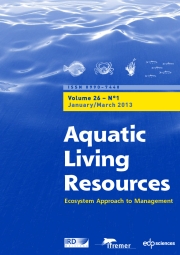Article contents
Role and consequences of fish diversity in the functioning of African freshwater ecosystems: a review
Published online by Cambridge University Press: 15 January 1995
Abstract
The need for a better understanding of the role of biodiversity in the functioning of aquatic ecosystems has been raised recently by several authors. If the question is not entirely new, its formulation is. It is therefore the opportunity to re-examine the pool of data already available in order to discuss some results that may be relevant for that purpose, while some major ecological questions have been identified. The top-down view argues that the effects of fish predation cascade down the trophic chain and are responsible for controlling the state of the entire ecosystem. The influence of fish predation on prey assemblages (prey selection, ontogenic shift) has been fairly well documented by various studies of African fish. They are also challenging subjects for studies of resource partitioning, a well documented example being given by zooplanktivores in Lake Turkana. The principle of cascading trophic interactions has been documented in Lake Victoria, after the introduction of a top predator, Lates niloticus. Another striking example is thatof Lake Nakuru where the introduction of a tilapiine resulted in a substantial increase of bird diversity, by the extension of the food chain to fish-eating birds. This introduced tilapiine may be considered as a keystone species, but this concept is questioned. A possible origin of fish biodiversity is adaptive radiation, that is to say the differentiation of species in morphology and resource use through competition. The cichlid flocks of the African Great Lakes where hundreds of rather similar species coexist, provide one of the best known examples of adaptive radiation. The question of niche overlap and functional redundancy has been raised and various studies have been conducted in the East African Lakes. The role of rare species has also been questioned. They may provide an insurance of ecosystem stability, which means that the more stable ecosystems in terms of key functions are those richest in species. In fact, in many large Nilo-Sudan river basins, there are apparently several groups of species which are able to replace the current assemblage when it experiences new ecological situations. Finally, the question has been raised as to what extent patterns of biodiversity are important for ecosystem productivity. The cornparison of data for four African lakes shows no relationship between fish diversity and fishery production, and speciesrichness does not appear to be a major determinant of basic production trends. At present we have only anecdotal, sometimes controversial, evidence of the role of fish diversity on the functioning of African freshwater ecosystems. We need to improve this knowledge on the importance of biodiversity in order to convince decision-makers that fish biodiversity needs protection.
Keywords
- Type
- Research Article
- Information
- Copyright
- © IFREMER-Gauthier-Villars, 1995
- 36
- Cited by


